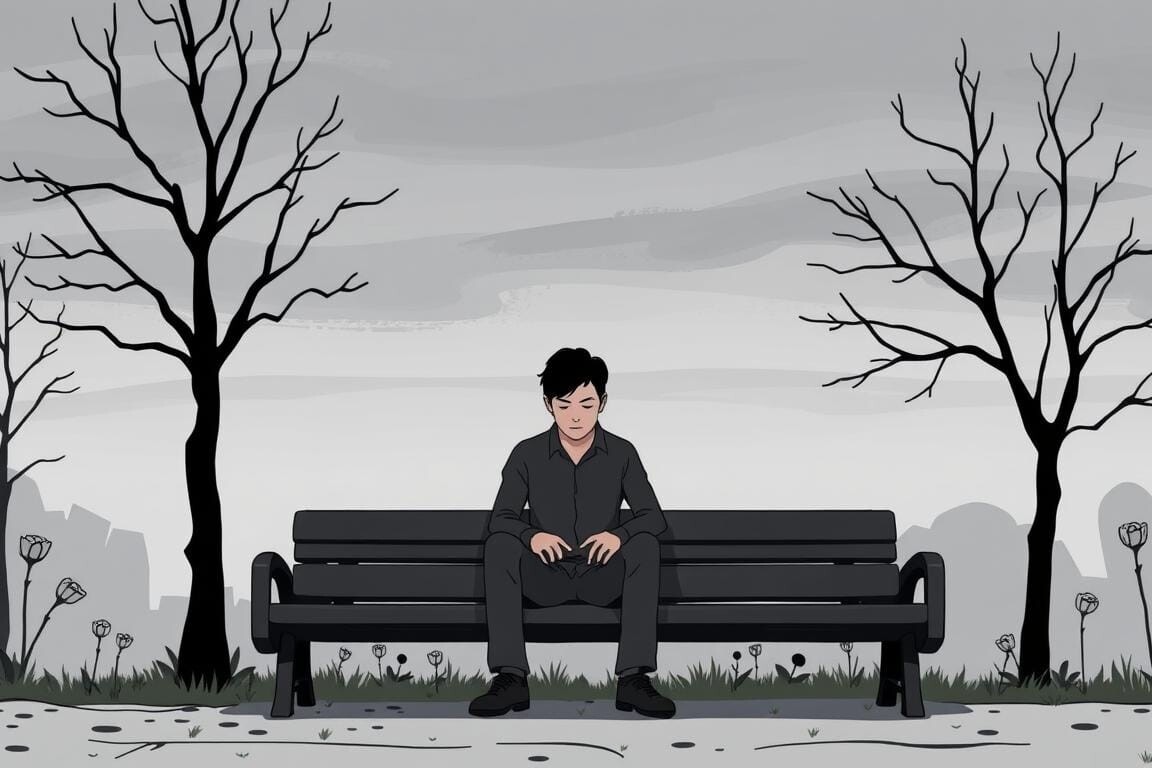Being a new mom is both joyful and tough. The birth of a child is a big change. It can also lead to mental health issues like postpartum depression and bipolar disorder. It’s key to understand these connections to help women during this time.
Dr. Chandril Chugh, an expert in maternal mental health, talks about the link between postpartum depression and bipolar disorder. He covers symptoms, risk factors, and treatment options. This will help you understand this important part of postpartum health better.
If you’re a new mom or supporting someone, this guide is for you. It will help you spot signs, find help, and cope. We’ll explore the complex world of postpartum mental health together. And make sure you get the care and support you need.
Table of Contents
ToggleUnderstanding Postpartum Depression and Bipolar Disorder
Becoming a new parent is exciting but also tough. Some women face postpartum depression or bipolar disorder. Knowing the signs and risks is key.
Symptoms and Risk Factors of Postpartum Depression
Postpartum depression hits up to 1 in 7 women after having a baby. It brings sadness, feeling not good enough, and trouble bonding with the baby. It can even lead to thoughts of harming oneself or the baby.
Things that might make a woman more likely to get postpartum depression include past depression, big hormonal changes, not enough support, and stressful times.
Bipolar Disorder: Definition and Types
Bipolar disorder makes people feel very up and down. They might feel super happy and full of energy, then very sad and tired. There are different kinds of bipolar disorder, like Bipolar I, Bipolar II, and cyclothymic disorder.
Up to 20% of women who seem depressed after having a baby might actually have bipolar disorder. Doctors use tools like the Mood Disorders Questionnaire (MDQ) to find out.
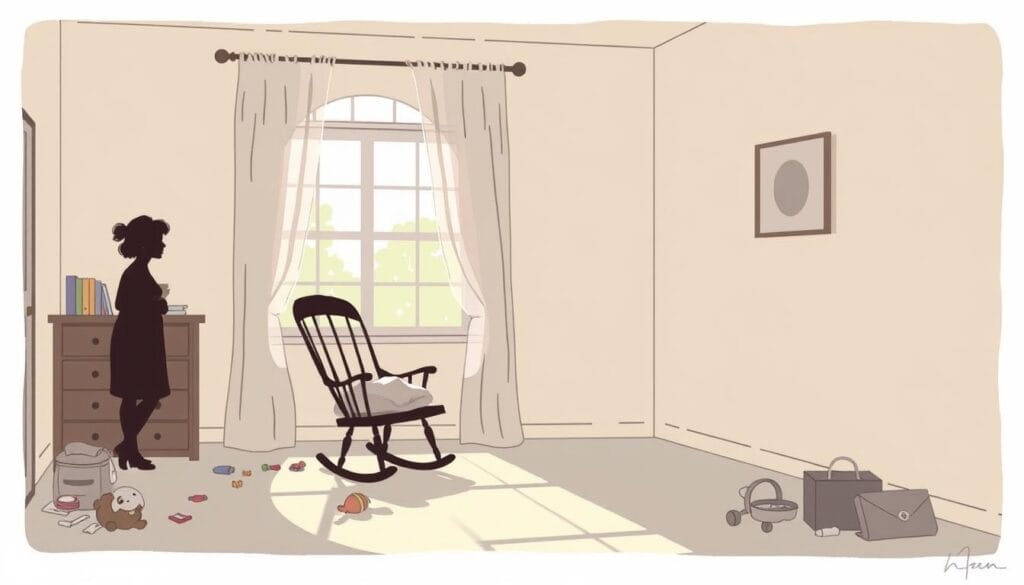
It’s important to understand both postpartum depression and bipolar disorder. This helps keep new moms safe and healthy. Knowing the signs and risks helps doctors help women during this important time.
The Connection Between Postpartum Depression and Bipolar Disorder
There is a strong link between postpartum depression and bipolar. Studies show women with bipolar are more likely to get postpartum depression. Sometimes, postpartum depression can be the first sign of bipolar disorder.
The hormonal changes and stress of childbirth can trigger mood swings in women with bipolar. This can lead to manic or depressive episodes.
The comorbidity of postpartum depression and bipolar disorder is a big worry for doctors. Bipolar disorder affects one to three percent of women. Women with bipolar are more likely to have symptoms after childbirth.
Some women may first show bipolar symptoms in the first year after giving birth. This is especially true if there’s a family history of bipolar.
It’s important for mothers and their partners to watch for early signs of bipolar disorder. Bipolar disorder causes big mood swings. This can include feeling very low or very high.
Severe bipolar can lead to thinking too highly of oneself, hallucinations, and paranoia. Getting help early for postpartum bipolar is key. It’s important for the mother’s safety and effective treatment.
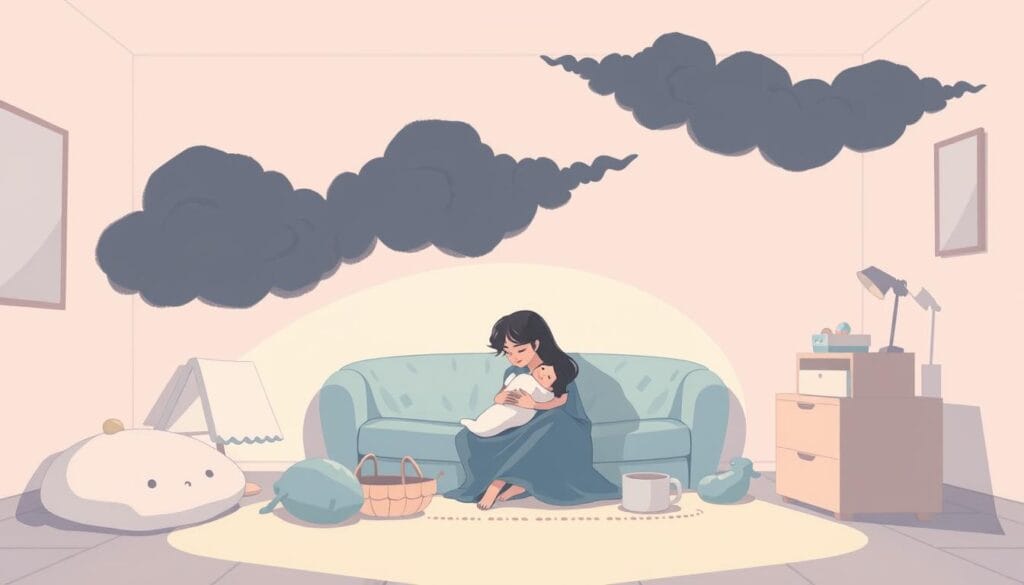
Understanding the link between postpartum depression and bipolar disorder is key. It helps in diagnosing and managing these conditions together. By recognizing this connection and getting support early, women can better handle the postpartum period. They can also focus on their mental health.
Postpartum Psychosis: A Severe Manifestation
Postpartum psychosis is a rare but serious mental health issue. It can happen in the weeks after a baby is born. Unlike postpartum depression, which is common, postpartum psychosis is a medical emergency. It needs immediate help.
Recognizing the Signs of Postpartum Psychosis
It’s important to spot the early signs of postpartum psychosis. This helps get medical help fast. Look out for:
- Sudden and severe mood swings
- Hallucinations, delusions, or disorganized thinking
- Confusion, disorientation, and trouble concentrating
- Paranoia or suspiciousness
- Inability to sleep or too much sleepiness
- Thoughts of harming oneself or the baby
If you or someone you know has these postpartum psychosis symptoms, get help right away. This condition is dangerous for both the mother and the baby. Quick action is key to keeping everyone safe.
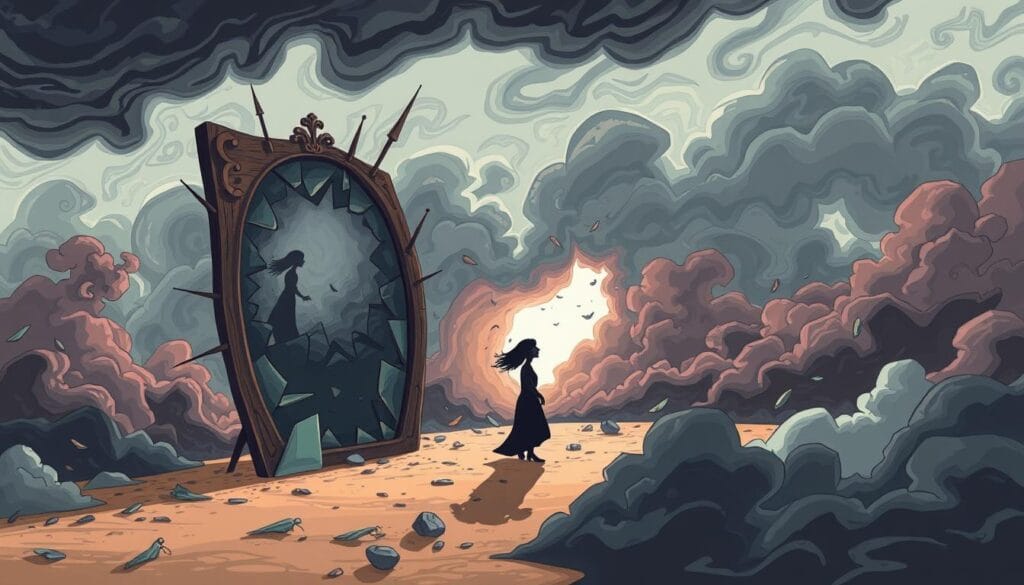
Research has found what might cause postpartum psychosis. Stress, immune problems, and family history are factors. Also, big life events, like losing a loved one, can raise the risk.
By spotting the signs of postpartum psychosis and getting medical help fast, mothers can get the care they need. This helps keep them and their babies safe and healthy.
Navigating the Decision to Have Another Child
Women who have had postpartum depression or bipolar disorder face a tough choice. They worry about the chance of it happening again. They also think about how it will affect their family and if they can handle it during another pregnancy and after.
Considerations and Challenges
Thinking about having another child is a big deal. Women must think about the good and bad sides. Studies show that bipolar disorder can come back during the postpartum period in about 45.7% of cases.
Stress, not enough support, and not following medication can make things worse. It’s key for these women to work with their doctors. They need a plan to manage their condition and lower risks during pregnancy and after.
Deciding to have another child is a big choice. Women need to think about their mental health, support, and how it will affect their family. It’s not something to rush into.
Medication Management During Pregnancy and Breastfeeding
Women with postpartum depression or bipolar disorder need to manage their meds carefully when pregnant or breastfeeding. Doctors must weigh the risks and benefits of each medication. They consider the mother’s mental health, the stage of pregnancy or breastfeeding, and how it might affect the baby.
Weighing the Risks and Benefits
Finding the right balance with medication is key during pregnancy and breastfeeding. Important things to think about include:
- The mother’s mental health and how it affects pregnancy or breastfeeding
- The risks of the medication to the baby
- Other options like therapy or lifestyle changes
- The benefits of keeping or changing the medication for the mother’s health
It’s vital for the patient and their healthcare team to talk openly. This helps find the best balance for the mother and the child.
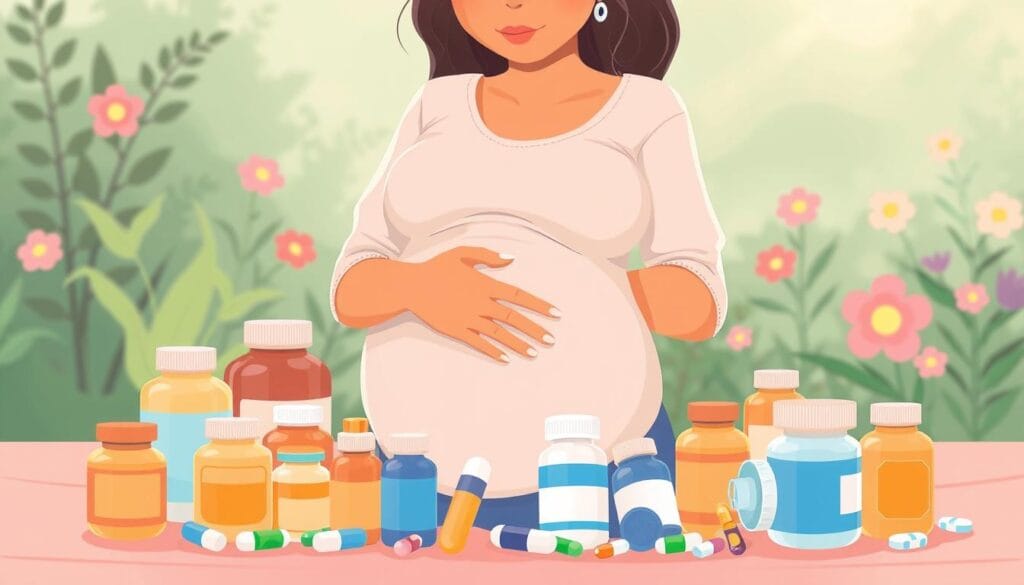
The National Comorbidity Survey found that bipolar spectrum disorder is common. Studies also talk about postpartum depression. Deciding to keep or change medication during pregnancy and breastfeeding is complex. It requires a careful look at the risks and benefits for both the mother and the baby.
Postpartum depression bipolar disorder: Seeking Professional Help
Getting help is key if you’re dealing with postpartum depression or bipolar disorder. These issues can really affect your mental health and how you care for your baby. By asking for help, you can get the right care and treatment to feel better.
Talking to a mental health expert, like a psychiatrist or a perinatal mental health therapist, is a big step. They can help you understand what’s going on and find ways to cope. They can also talk about therapy and medicine options.
Support groups and community resources are also great. They let you connect with others who know what you’re going through. This can give you emotional support and practical advice.
Remember, you’re not alone. By seeking help, you’re taking care of your mental health. This is a big step towards a better postpartum experience. Don’t be afraid to ask for help.
If you or someone you know is struggling, there are resources to help:
- Postpartum Support International (PSI) – Offers support and resources for women with postpartum depression and other mental health issues.
- National Suicide Prevention Lifeline – Provides 24/7 free and confidential support for those in distress, including postpartum depression.
- Local mental health providers – Find licensed professionals in your area who specialize in perinatal mental health through your healthcare or insurance provider.
Don’t wait to get the help you need. Your mental health and your baby’s well-being are very important. With the right support, you can get through this tough time and come out stronger.
Coping Strategies and Support Systems
Dealing with postpartum depression and bipolar disorder is tough. But, there are ways to cope and get support. Self-care and mindfulness are key to managing symptoms and feeling better.
Self-Care and Mindfulness Techniques
Creating a self-care routine is vital for new moms. This might include:
- Getting enough rest and sleep
- Maintaining a healthy, balanced diet
- Engaging in regular exercise, such as gentle yoga or walking
- Practicing stress-management techniques like meditation or deep breathing
Mindfulness helps manage emotions. It keeps you calm and present. This is helpful for new moms.
Having a strong support network is important. Talk to family, friends, and local groups for help. Support groups offer connection and understanding.
Remember, managing these conditions is a journey. Seeking help is a sign of strength. With self-care, mindfulness, and support, new moms can thrive.
Advocacy and Awareness
It’s key to raise awareness and push for better support for women with postpartum depression and bipolar disorder. We need better mental health services, more research funding, and policies that help mothers. Sharing our stories and educating others can help break the stigma and ensure all mothers get the care they need.
Postpartum bipolar is rare but can hit any mother. The risk of severe mental illness is higher right after childbirth than at any other time. Women with a family history of bipolar are at higher risk, and it can first appear after childbirth.
Mental health checks during pregnancy are very helpful. Postpartum Support International offers online groups in English and Spanish for mothers with mood disorders. But, we need more education for doctors and caregivers about postpartum bipolar.
About one in seven women gets perinatal depression. Up to 85% of new moms get the “baby blues,” which is short and usually doesn’t need medical help. Around 10-15% of white women get postpartum depression, with even higher rates for other racial groups like Latina women.
Nearly two-thirds of women with perinatal depression also have anxiety. About 10% of dads get depression in the first year after their child’s birth. Latina women are more likely to have faced traumatic events, which increase depression risk. More social support can help protect against depression in diverse groups.
By spreading awareness and pushing for more resources, we can help all new moms thrive. This is crucial for their well-being and that of their families.
Conclusion
Understanding the link between postpartum depression and bipolar disorder is key. It shows how important it is to care for a new mom’s mental health. These conditions can really affect a woman’s life and her family.
By learning more about these issues, we can help mothers feel less alone. We can work to make sure every new mom gets the help she needs. This way, they can do well after having a baby.
Don’t forget, you’re not alone. Talk to doctors, join support groups, and share with your family. With the right help, you can beat these challenges and enjoy your new life.
FAQ
What are the symptoms and risk factors of postpartum depression?
Postpartum depression can make you feel sad and not good enough. It’s hard to bond with your baby. You might even think about harming yourself or your baby. Risk factors include depression history, hormonal changes, lack of support, and stressful life events.
What is bipolar disorder, and what are the different types?
Bipolar disorder makes you feel very up and down. You might feel too happy and full of energy, then very sad and tired. There are three main types: Bipolar I, Bipolar II, and cyclothymic disorder. Each has its own symptoms and patterns.
What is the connection between postpartum depression and bipolar disorder?
Women with bipolar disorder are more likely to get postpartum depression. Sometimes, postpartum depression is the first sign of bipolar disorder. The changes in hormones and stress from having a baby can trigger mood swings in women with bipolar disorder.
What is postpartum psychosis, and what are the signs to look for?
Postpartum psychosis is a serious condition. It makes you see things that aren’t there and think in a way that’s not normal. It’s dangerous for you and your baby. Look for sudden mood changes, confusion, and paranoia. Get help right away.
What factors should be considered when deciding to have another child after experiencing postpartum depression or bipolar disorder?
Deciding to have another child is hard for women with postpartum depression or bipolar disorder. You might worry about getting depressed again, how it affects your family, and managing your condition during pregnancy and after. Talk to your doctor about the risks and benefits.
How is medication management handled for women with postpartum depression or bipolar disorder who are considering pregnancy or breastfeeding?
Managing medication is key for women with postpartum depression or bipolar disorder who might get pregnant or are breastfeeding. Your doctor will look at the risks and benefits of different medicines. They’ll consider your mental health, the stage of pregnancy or breastfeeding, and how it might affect your baby. It’s important to talk openly with your healthcare team.
Where can women with postpartum depression or bipolar disorder seek professional help and support?
Women with postpartum depression or bipolar disorder need professional help. See a mental health specialist like a psychiatrist or perinatal mental health therapist. They can help you get a diagnosis and treatment plan. Support groups and community resources can also offer help and support.
What coping strategies and support systems can help women manage postpartum depression and bipolar disorder?
Besides professional help, there are ways to cope with postpartum depression and bipolar disorder. Take care of yourself by resting, eating well, and exercising. Mindfulness, like meditation, can help with stress and mood. Having a strong support network is also important for emotional and practical help.
How can we increase awareness and advocate for better support and resources for women with postpartum depression and bipolar disorder?
We need to raise awareness and push for better support and resources for women with postpartum depression and bipolar disorder. We should fight for more mental health services, research funding, and policies that support maternal mental health. Sharing your story and educating others can help reduce stigma and ensure women get the care they need.
Source Links
- Pregnant and Postpartum Women with Bipolar Disorder: Taking the Care to Where They Are
- Postpartum Depression: Unipolar or Bipolar? – MGH Center for Women’s Mental Health
- Postpartum Bipolar Disorder: Symptoms, Treatment, Outlook
- Bipolar Disorder in the Postnatal Period
- Baby Blues and Postpartum Depression: Mood Disorders and Pregnancy
About The Author

Medically reviewed by Dr. Chandril Chugh, MD, DM (Neurology)
Dr. Chandril Chugh is a U.S.-trained, board-certified neurologist with expertise in diagnosing and managing neurological disorders, including migraines, epilepsy, Parkinson’s disease, and movement disorders. His clinical focus includes evidence-based neurological care and patient education.
All content is reviewed for medical accuracy and aligned with current neurological guidelines.




